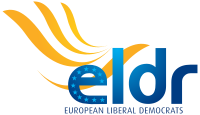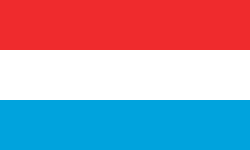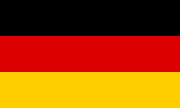European Liberal Democrat and Reform Party
| European Liberal Democrat and Reform Party Europäische liberale demokratische und Reformpartei Parti européen des libéraux, démocrates et réformateurs Partito europeo dei democratici, liberali e riformatori Partido Europeo de los Liberales, Demócratas y Reformistas Partij van Europese Liberalen en Democraten Páirtí liobrálacha Democrat agus Athchóirithe na hEorpa Partidul Liberal Democrat European |
|
|---|---|
 |
|
| President | Annemie Neyts-Uyttebroeck MEP |
| Founded | March 1976 (as "Federation of Liberal and Democrat Parties in Europe") April 30, 2004 (as formal Party) |
| Headquarters | Rue Montoyer/Montoyerstraat 31, 1000 Brussels, Belgium |
| Ideology | Liberalism Classical liberalism Conservative liberalism Social liberalism |
| International affiliation | Liberal International |
| European Parliament Group | Alliance of Liberals and Democrats for Europe |
| Official colours | Gold and Blue |
| Website | |
| www.eldr.eu | |
| Politics of the European Union Political parties Elections |
|
The European Liberal Democrat and Reform Party is a European political party, mainly active in the European Union, composed of 56 national-level liberal and liberal-democratic parties from across Europe. Having developed from a loose confederation of national political parties in the 1970s, the ELDR is now a recognised European political party incorporated as a non-profit association under Belgian law. Despite this legal status, the ELDR party has yet to achieve significant grassroots involvement and retains much of the character of a mere confederation of national political parties. Internationally, ELDR is affiliated to the Liberal International.
As of 2010, the ELDR is the third-largest political party represented in European Union institutions, with 74 Member of the European Parliament and 8 members of the European Commission. Out of 27 member states of the European Union, there are four with a liberal prime minister: Lars Lökke Rasmussen in Denmark (Venstre), Andrus Ansip in Estonia (Eesti Reformierakond), Mari Kiviniemi in Finland (Suomen Keskusta) and Brian Cowen in the Irish Republic (Fianna Fáil). The leader of the Dutch liberal party VVD, Mark Rutte, is poised to become the next prime minister of the Netherlands, after his election victory in june 2010. Furthermore, the leader of the German liberal party FDP, Guido Westerwelle, serves as vice-chancellor of the Federal Republic of Germany and the leader of the British Liberal Democrats, Nick Clegg, serves as deputy prime minister of the United Kingdom. Liberals are also in government in four other EU-member states: Belgium, Lithuania, Slovenia and Sweden.
ELDR is politically represented in the European Parliament by the Alliance of Liberals and Democrats for Europe (ALDE) parliamentary group, formed in conjunction with the European Democratic Party, and led by Guy Verhofstadt, a former Prime Minister of Belgium.
The youth wing of the ELDR Party is the European Liberal Youth (LYMEC), which is predominantly based upon youth and student liberal organisations from across Europe but also contains a small number of individual members. LYMEC is led by a Franco-Belgian politician Aloys Rigaut (MR, Belgium), who was elected to a two-year term as LYMEC President in May 2008, and has a collective membership of over 200,000 young liberal Europeans.
Contents |
Leadership
The leadership of the ELDR Party is Annemie Neyts, a Flemish MEP for the Belgian party Flemish Liberals and Democrats and spokesperson on Foreign affairs, security and defense for the ALDE group. Neyts was elected for a two-year term of office at the meeting of the ELDR Party Congress held in Bratislava in September 2005. She was re-elected for a two-year term at the ELDR Congress in Berlin in 2007 and again in the Congress in Barcelona 2009.
In her mission statement for the party presidency, Annemie Neyts declared: “The most fundamental tenets of ELDR, liberalism, the spread of freedom, democracy and economic development by virtue of integration into the EU and the EU herself are being questioned as seldom before. The need for a strong, well-articulated, future-oriented answer from ELDR, the European political party that embodies liberalism has never been greater. I intend to spend a large amount of my time helping ELDR meet the huge challenges it is faced with.”
Former President of Liberal International between 1999 and 2005, Annemie Neyts was Belgian State secretary for Foreign Affairs in 2000-2001 and Deputy Minister for foreign Affairs in charge of European Affairs, International trade and Agriculture between 2001 and 2003. She was previously a Minister for the Brussels region and Member of Parliament in Belgium.
Structure
Bureau
The day to day management of the ELDR Party is handled by the Bureau, the members of which are:
President
- Annemie Neyts MEP (OpenVLD, Belgium): ELDR Party President
Vice-Presidents
- Sharon Bowles MEP (Lib Dem, UK)
- Lena Ek MEP (Centerpartiet, Sweden)
- Marc Guerrero (CDC Catalonia, Spain)
- Markus Löning MP (FDP, Germany)
- Leoluca Orlando MEP (Italia dei Valori, Italy)
- Vesna Pusić MP (HNS, Croatia)
- Lousewies van der Laan MEP (D66, Netherlands)
Treasurer
ALDE group leaders
- Guy Verhofstadt MEP (OpenVLD, Belgium): ALDE Group Leader, European Parliament
- Anne Brasseur (DP, Luxembourg): ALDE Group President in the Parliamentary Assembly of the Council of Europe
- Flo Clucas (Lib Dem, UK): ALDE Group Leader, EU Committee of the Regions
Other party officials
- Willy De Clercq MEP (VLD, Belgium): Honorary President
- Federica Sabbati (Italy): ELDR Party Secretary-General
- Alexander Beels (VVD, Netherlands): ALDE Group Secretary-General
- Aloys Rigaut (MR, Belgium): President, European Liberal Youth (LYMEC)
- Hans van Baalen MEP (VVD, Netherlands): President, Liberal International
ELDR Congress
The ELDR Congress is the sovereign body of the ELDR corporation, usually meeting on an annual basis, and as such its primary purposes are to:
- Elect members of the ELDR Bureau
- Debate, and adopt, resolutions on matters of policy;
- Adopt the ELDR Party's electoral manifesto for European Parliament elections
- Make amendments to the ELDR Party Statutes
The voting members of the ELDR Congress number around 600-700, and are composed of:
- Members of the ELDR Council
- A number of representatives nominated by each of the Member Parties based on the number of votes that Party received at the last set of European Parliament elections,
- 2 representatives nominated by each of the Affiliate Parties, and
- 10 representatives nominated by the European Liberal Youth.
In addition to the voting members of the ELDR Congress, the following are entitled to attend as non-voting members:
- ELDR members of the European Parliament,
- ELDR members of the EU Committee of the Regions,
- One delegate nominated by each of the liberal-democratic groupings in other European parliamentary assemblies, and
- One delegate nominated by Liberal International
ELDR Council
The ELDR Council acts as the ELDR Party's de facto executive committee, meeting in between meetings of the ELDR Congress, and is empowered to:
- Approve the budget of the ELDR Party;
- Approve ELDR membership applications; and
- Speak and act on behalf of the ELDR Party in between meetings of the ELDR Congress.
The voting members of the ELDR Council number around 100-150 members and are composed of:
- Voting members of the Bureau,
- Two or more representatives nominated by each of the Member Parties based on the number of votes that Party received at the last set of European Parliament elections, and
- One representative nominated by each of the Affiliate Parties, and
- One representative nominated by the European Liberal Youth
In addition to the voting members of the ELDR Council, the following are entitled to attend as non-voting members:
- Non-voting members of the Bureau,
- One representative nominated by each of the liberal-democratic groups in European parliamentary assemblies (including the European Parliament and the Committee of the Regions), and
- One representative nominated by Liberal International
ELDR Political Leaders' Meeting
In addition to the formal structure of the ELDR Party, there are convened at least two Political Leaders' Meetings a year in order to exchange views on the items on the agenda of the European Council and more general views on the European political situation.
The members of the Political Leaders' Meeting are:
- The President and Vice-Presidents of the ELDR Party
- ELDR Members of the European Commission
- ELDR Heads of Government
- The political leaders of ELDR Member Parties
- Other ELDR Ministers
- The President of the European Liberal Youth
Leaders
- 1978-1981:
 Gaston Thorn
Gaston Thorn - 1981-1985:
.svg.png) Willy De Clercq
Willy De Clercq - 1985-1990:
 Colette Flesch
Colette Flesch - 1990-1995:
.svg.png) Willy De Clercq
Willy De Clercq - 1995-2000:
 Uffe Ellemann-Jensen
Uffe Ellemann-Jensen - 2000-2005:
 Werner Hoyer
Werner Hoyer - 2005-:
.svg.png) Annemie Neyts-Uyttebroeck
Annemie Neyts-Uyttebroeck
History of pan-European liberalism
| Part of a series on |
| Liberalism |
|---|
|
Development
History of liberalism
Contributions to liberal theory |
|
Ideas
Political liberalism
Political freedom Cultural liberalism Democratic capitalism Democratic education Economic liberalism Free trade · Individualism Laissez faire Liberal democracy Liberal neutrality Negative / positive liberty Market economy · Open society Popular sovereignty Rights (individual) Separation of church and state |
|
Schools
American · Anarcho-liberalism
Classical · Conservative Democratic · Green Libertarianism · Market National · Neoliberalism Ordoliberalism · Paleoliberalism Radicalism · Social |
|
People
John Locke · Adam Smith
Adam Ferguson Thomas Jefferson Thomas Paine · David Hume Baron de Montesquieu Immanuel Kant · Jeremy Bentham Thomas Malthus Wilhelm von Humboldt Frederic Bastiat John Stuart Mill · Thomas Hill Green Leonard Trelawny Hobhouse John Maynard Keynes Bertrand Russell Ludwig von Mises Friedrich von Hayek · Isaiah Berlin Joel Feinberg John Rawls · Robert Nozick |
|
Regional variants
Worldwide
Europe · United States By country |
|
Religious liberalism
|
|
Organizations
Liberal parties
Liberal International International Federation of
Liberal Youth (IFLRY) European Liberal Democrat and
Reform Party (ELDR) Alliance of Liberals and
Democrats for Europe (ALDE) European Liberal Youth (LYMEC)
Council of Asian Liberals and
Africa Liberal Network (ALN)Democrats (CALD) Liberal Network for
Latin America (Relial) |
Pan-European liberalism has a long history dating back to the foundation of Liberal International in April 1947. In March 1976, the Federation of Liberal and Democrat Parties in Europe was established, which gradually evolved into the ELDR Party with a matching group in the European Parliament,
At an extraordinary Congress in Brussels held on April 30, 2004 the day before the enlargement of the European Union, the ELDR Party incorporated itself under Belgian law and later became a European political party.
The ELDR Europarty allied with the European Democratic Party in 2004 to form the Alliance of Liberals and Democrats for Europe, with a matching group in the European Parliament.
European Commissioners
ELDR Member Parties contribute 8 out of the 27 members of the European Commission:
- Karel De Gucht (OpenVLD, Belgium): European Commissioner for Trade
- Máire Geoghegan-Quinn (Fianna Fáil, Ireland): European Commissioner for Science and Research
- Siim Kallas (ERP, Estonia): Vice-President, European Commissioner for Transport
- Neelie Kroes (VVD, Netherlands): Vice-President, European Commissioner for Digital Agenda
- Cecilia Malmström (Liberal People's Party (Sweden), Sweden): European Commissioner for Home Affairs
- Janez Potočnik (LDS, Slovenia): European Commissioner for the Environment
- Olli Rehn (Keskusta, Finland): European Commissioner for Economic and Financial Affairs
- Androula Vassiliou (United Democrats, Cyprus): European Commissioner for Education, Culture, Multilingualism and Youth
Elected Representatives of Member Parties
European institutions
| Organisation | Institution | Number of seats |
|---|---|---|
| European Commission |
8 / 27
|
|
| European Council (Heads of Government) |
4 / 27
|
|
| Council of the EU (Participation in Government) |
10 / 27
|
|
| European Parliament |
75 / 736
|
|
| Parliamentary Assembly |
28 / 318
|
National Parliaments of European Union member states
| Country | Institution | Number of seats | Member parties |
|---|---|---|---|
| Chamber of Representatives Lower house |
41 / 150
|
MR, VLD | |
| Senate Upper house |
11 / 40
|
MR, VLD | |
| National Assembly |
38 / 240
|
MRF | |
| Folketing |
55 / 175
|
V, RV | |
| State Council |
60 / 101
|
ER, EK | |
| Parliament |
60 / 200
|
Kesk., SFP | |
| National Assembly Lower house |
7 / 577
|
PRG | |
| Bundestag Lower house |
93 / 622
|
FDP | |
| Dáil Lower house |
72 / 166
|
FF | |
| Senate Upper house |
27 / 60
|
FF | |
| Chamber of Deputies Lower house |
19 / 630
|
IdV, Radicali | |
| Senate of the Republic Upper house |
16 / 315
|
IdV, Radicali, MRE | |
| Saeima |
5 / 100
|
LC | |
| Seimas |
20 / 141
|
LRLS, LCS, NU(S) | |
| Seimas |
20 / 141
|
LRLS, LCS, NU(S) | |
| Chamber of Deputies |
9 / 60
|
DP | |
| House of Representatives Lower house |
41 / 150
|
VVD, D66 | |
| Senate Upper house |
16 / 75
|
VVD, D66 | |
| Sejm Lower house |
0 / 460
|
currently no representation ] | |
| Chamber of Deputies Lower house |
53 / 333
|
PNL | |
| Senate Upper house |
22 / 137
|
PNL | |
| National Assembly |
14 / 90
|
Zares, LDS | |
| Congress of Deputies Lower house |
5 / 350
|
CDC | |
| Senate Upper house |
4 / 264
|
CDC | |
| Riksdag |
57 / 349
|
C, FpL | |
| House of Commons Lower house |
58 / 650
|
Lib Dems, Alliance | |
| House of Lords Upper house |
72 / 704
|
Lib Dems, Alliance |
National Parliaments outside the European Union
| Country | Institution | Number of seats | Member parties |
|---|---|---|---|
| General Council |
11 / 28
|
PLA | |
| National Assembly |
5 / 125
|
Musavat | |
| Sabor |
12 / 153
|
HNS, IDS, HSLS | |
| Parliament |
2 / 150
|
Republican | |
| Assembly |
13 / 120
|
AKR | |
| Assembly |
5 / 120
|
LDP, LPM | |
| Parliament |
7 / 101
|
PAMN | |
| Storting |
2 / 169
|
Venstre | |
| National Assembly |
11 / 250
|
LDP | |
| National Council Lower house |
31 / 200
|
FDP | |
| Council of States Upper house |
12 / 46
|
FDP |
Member parties

- Liberal Forum (Liberales Forum)
- Flemish Liberals and Democrats (Vlaamse Liberalen en Democraten)
- Reformist Movement (Mouvement Réformateur)
- Movement for Rights and Freedoms (Dvizhenie za prava i svobodi)
- National Movement for Stability and Progress (Nacionalno dviženie za stabilnost i vǎzhod)
- United Democrats (Ενωμένοι Δημοκράτες)
- Danish Social Liberal Party (Det Radikale Venstre)
- Liberal Party of Denmark (Venstre)
- Estonian Centre Party (Eesti Keskerakond )
- Estonian Reform Party (Eesti Reformierakond)
- Centre Party (Suomen Keskusta)
- Swedish People's Party (Svenska Folkpartiet)
- Radical Party of the Left (Parti radical de gauche)
- Free Democratic Party (Freie Demokratische Partei)
- Alliance of Free Democrats (Szabad Demokraták Szövetsége)
- European Republicans Movement (Movimento Repubblicani Europei)
- Italian Radicals (Radicali Italiani)
- Italian Republican Party (Partito Repubblicano Italiano)
- Italy of Values (Italia dei Valori)
- Latvian Way (Latvijas Ceļš)
- Liberal and Centre Union (Liberalų ir centro sąjunga)
- New Union (Social Liberals) (Naujoji sąjunga (socialliberalai))
- Liberals' Movement of the Republic of Lithuania (Lietuvos Respublikos liberalu sajudis)
- Democratic Party (Demokratesch Partei)
- Democrats 66 (Democraten 66)
- People's Party for Freedom and Democracy (Volkspartij voor Vrijheid en Democratie)
- Democratic Party - demokraci.pl (Partia Demokratyczna - demokraci.pl)
- National Liberal Party (Partidul Naţional Liberal)
- Free Forum (Slobodné fórum)
- Liberal Democracy of Slovenia (Liberalna demokracija Slovenije)
- For Real (Zares)
- Democratic Convergence of Catalonia (Convergència Democràtica de Catalunya)
- Majorcan Union (Unió Mallorquina)
- Liberal Democratic Centre (Centro Democrático Liberal)
- Centre Party (Centerpartiet)
- Liberal People's Party (Folkpartiet Liberalerna)
- Liberal Democrats
- Alliance Party of Northern Ireland
Outside the EU
- Liberal Party of Andorra (Partit Liberal d'Andorra)
- Pan-Armenian National Movement
- Müsavat Party (Müsavat Partiyası)
- Liberal Democratic Party (Liberalno Demokratska Stranka)
- Croatian People's Party – Liberal Democrats (Hrvatska Narodna Stranka - Liberalni Demokrati)
- Croatian Social Liberal Party (Hrvatska socijalno liberalna stranka)
- Istrian Democratic Assembly (Istarski demokratski sabor/Dieta Democratica Istriana)
- Republican Party of Georgia
- New Kosovo Alliance (Aleanca Kosova e Re)
- Liberal Party of Kosovo (Partia Liberale e Kosoves)
- Liberal Party of Macedonia (Liberalna Partija na Makedonija)
- Liberal Democratic Party (Liberalno-Demokratska Partija)
- Party Alliance Our Moldova (Partidul Alianţâ Moldova Noastrâ)
- Liberal Party of Norway (Venstre)
- Russian People's Democratic Union (Народно-демократический союз)
- Yabloko (Российская объединенная демократическая партия "ЯБЛОКО")
- Liberal Democratic Party (Либерално-демократска партија, Liberalno-demokratska partija)
- Free Democratic Party of Switzerland (Freisinnig-Demokratische Partei der Schweiz/Parti radical-démocratique suisse/Partito liberale radicale svizzero/Partida liberaldemocrata svizra)
See also
- Political parties of the world
- Liberal International
- European Liberal Youth
External links
|
|||||||||||||||||||||||
|
|||||||||||||||||||